Michigan International Speedway facts for kids
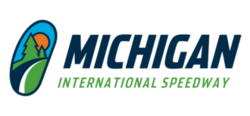
|
|
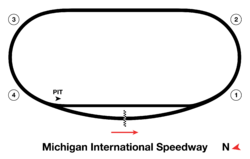
D-shaped Oval (1968–present)
|
|
| Location |
|
|---|---|
| Time zone | UTC−05:00 (UTC−04:00 DST) |
| Coordinates | 42°03′59″N 84°14′29″W / 42.06639°N 84.24139°W |
| Capacity | 56,000 |
| Owner | NASCAR (November 2019–present) |
| Broke ground | September 27, 1967 |
| Opened | October 13, 1968 |
| Construction cost | US$4.5 million |
| Former names | Michigan Speedway (1997–2000) |
| Major events | Current: NASCAR Cup Series FireKeepers Casino 400 (1969–1972, 1974–present) Consumers Energy 400 (1969–2020) NASCAR Craftsman Truck Series Henry Ford Health System 200 (1999–2000, 2002–2020, 2025) Former: NASCAR Xfinity Series Cabo Wabo 250 (1992–2019, 2021–2024) IRL/IndyCar Michigan Indy 400 (2002–2007) CART Michigan 500 (1979–2001) U.S. 500 (1996) USAC (1968, 1970–1978) IMSA GT Championship (1984) Trans-Am Series (1969, 1971) Can-Am (1969) |
| D-shaped Oval (1968–present) | |
| Length | 2.000 mi (3.219 km) |
| Banking | Turns: 18° Frontstretch: 12° Backstretch: 5° |
| Race lap record | 0:30.767 ( |
| Infield Road Course (1968–present) | |
| Length | 1.900 mi (3.058 km) |
| Race lap record | 1:06.060 ( |
| Extended Road Course (1968–1994) | |
| Length | 3.310 mi (5.327 km) |
| Race lap record | 1:36.100 ( |
Michigan International Speedway is a famous race track in Cambridge Township, Michigan, USA. It's a D-shaped oval, which means it looks like a "D" from above. The track is 2 miles (3.2 kilometers) long.
This speedway has hosted many big car races over the years. These include exciting events from NASCAR, CART, and IndyCar. The track can hold 56,000 fans, which is a lot of people!
Besides the main oval, there are also three different road courses. These were designed by the famous British race car driver Stirling Moss. These courses use parts of the oval and areas inside and outside the track. Today, NASCAR owns the speedway.
The idea for Michigan International Speedway started in the 1960s with a man named Lawrence LoPatin. He wanted to build a big sports complex. The track opened in 1968. However, it soon ran into money problems. In 1973, a businessman named Roger Penske bought the track and saved it. He made many improvements. Later, in 1999, the track was sold to the France family's International Speedway Corporation (ISC). In 2019, NASCAR took over ownership when it merged with ISC.
About the Track
Track Shape and Features
The main track is 2 miles (3.2 km) long. It has special sloped turns called "banking." The turns are banked at 18 degrees, which helps cars go faster. The front straight part of the track is banked at 12 degrees, and the back straight is banked at 5 degrees.
Inside the main oval, there are also road courses. These were part of the original design by Stirling Moss. They offer different challenges for racers. There are three main layouts for these road courses, with lengths like 1.25 miles (2.0 km), 2.25 miles (3.6 km), and 3.5 miles (5.6 km).
What Fans Can Find at the Speedway
Michigan International Speedway covers a huge area, more than 1,400 acres! It's easy to get to, located near U.S. Route 12 and M-50.
As of 2021, the track can seat 56,000 people. In its busiest times, around 2006, it could hold over 137,000 fans! For those who want a special experience, there are luxury seating areas. These include the Acceleration Club, the Champions Club, and the Victory Lane Club.
History of the Track
Building the Speedway
In 1966, Lawrence LoPatin wanted to build a big auto-racing track. He looked at different locations near cities like Detroit and Chicago. In 1967, he chose a spot in Cambridge Township, Michigan. The plan was for a 700-acre track that would cost $4.5 million.
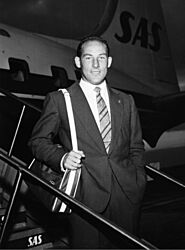
Construction began on September 27, 1967. Famous British racer Stirling Moss helped start the building work. The track was designed with a 2-mile oval and the special road courses. The first race was set for October 1968. Before it opened, two grandstands were built, seating 25,000 people.
Early Challenges and Changes
The speedway officially opened on October 13, 1968. The first race was a success, but there were big traffic jams. Soon after, NASCAR signed a 10-year deal to hold two big races there each year.
However, the company that owned the track, American Raceways, ran into financial trouble. They had expanded too quickly and built up a lot of debt. Weather problems also affected how many people came to the races, which hurt profits.
In 1970, the company faced even more money problems. They owed a lot of money and were close to losing the track.
Roger Penske Takes Over
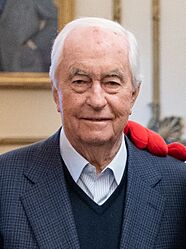
In 1973, a well-known motorsports businessman, Roger Penske, stepped in. He bought the speedway for $2.7 million, saving it from financial ruin. Penske immediately planned to improve the track. He wanted to fix up the garage areas, spectator facilities, and repave the oval.
Under Penske's leadership, the track grew a lot. He added more seating capacity several times in the 1980s. In 1986, the track surface was repaved again. Sadly, in 1992, a driver named Clifford Allison had a fatal crash during a practice session.
In the 1990s, the track saw huge growth as NASCAR became more popular. More seats were added, bringing the capacity to over 125,000. In 1996, the track was briefly renamed Michigan Speedway. In 1998, during a CART race, a crash caused a tire to go into the grandstands, injuring several fans. After this, the safety fence around the track was made taller to protect everyone.
New Owners and Modern Updates
In 1999, Roger Penske sold his tracks, including Michigan Speedway, to the France family's International Speedway Corporation (ISC). The next year, the track went back to its original name, Michigan International Speedway.
Over the years, many updates were made. In 2004, SAFER barriers were installed. These are special walls that help absorb impact during crashes, making the track safer for drivers. New luxury areas and a solar-powered media center were also built. The track was repaved for the fourth time in 2012.
In the 2010s, the track's seating capacity was reduced. This was done to modernize the facility and create new areas, like luxury campsites. By 2018, the seating capacity was 56,000. In 2019, NASCAR officially took over ownership of the speedway.
Exciting Events at the Track
Car Races
NASCAR Races
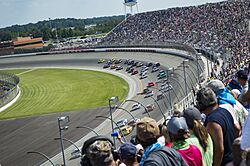
Michigan International Speedway hosts one big NASCAR weekend each year. The main event is a NASCAR Cup Series race called the FireKeepers Casino 400. The track also hosts the NASCAR Craftsman Truck Series race, the Henry Ford Health System 200. In the past, it also held races for the NASCAR Xfinity Series.
Open-Wheel Racing
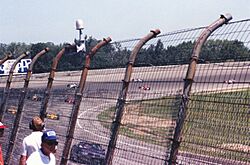
For many years, open-wheel cars (like Indy cars) raced at the speedway. These races were run by groups like the United States Auto Club (USAC), Championship Auto Racing Teams (CART), and the Indy Racing League (IRL). The very first race at the speedway in 1968 was an open-wheel event.
From 1981, the track hosted a 500-mile (800 km) open-wheel race. CART ran this race until 2002, when the IRL took over. The IRL continued to race here until 2007.
Other Fun Events
- The International Race of Champions (IROC) also raced at the speedway for many years, from 1974 until 2001.
- Since 1996, the track has been the home for the cross country finals for the Michigan High School Athletic Association (MHSAA).
- From 2012 to 2017, the speedway was the finish line for the Wish-A-Mile bike charity ride, which helps the Make-A-Wish Foundation.
- Since 2013, the track has hosted the Faster Horses Festival, a popular country music festival.
Fastest Laps
Here are some of the fastest official race lap records at Michigan International Speedway:
| Category | Time | Driver | Vehicle | Event |
|---|---|---|---|---|
| D-shaped Oval: 3.219-km (1968–present) | ||||
| CART | 0:30.767 | Adrián Fernández | Lola T96/00 | 1996 Marlboro 500 |
| IndyCar | 0:32.2730 | Bryan Herta | Dallara IR-03 | 2003 Firestone Indy 400 |
| NASCAR Cup | 0:36.093 | Kevin Harvick | Ford Fusion | 2018 FireKeepers Casino 400 |
| NASCAR Xfinity | 0:38.290 | Paul Menard | Ford Mustang | 2019 LTi Printing 250 |
| Infield Road Course: 3.058-km (1968–present) | ||||
| IMSA GTP | 1:06.060 | Bill Whittington | March 84G | 1984 Michigan 500k |
| Extended Road Course: 5.327-km (1968–1994) | ||||
| Can-Am | 1:36.100 | Denny Hulme | McLaren M8B | 1969 Michigan International Can-Am |
See also
 In Spanish: Michigan International Speedway para niños
In Spanish: Michigan International Speedway para niños
 | DeHart Hubbard |
 | Wilma Rudolph |
 | Jesse Owens |
 | Jackie Joyner-Kersee |
 | Major Taylor |

